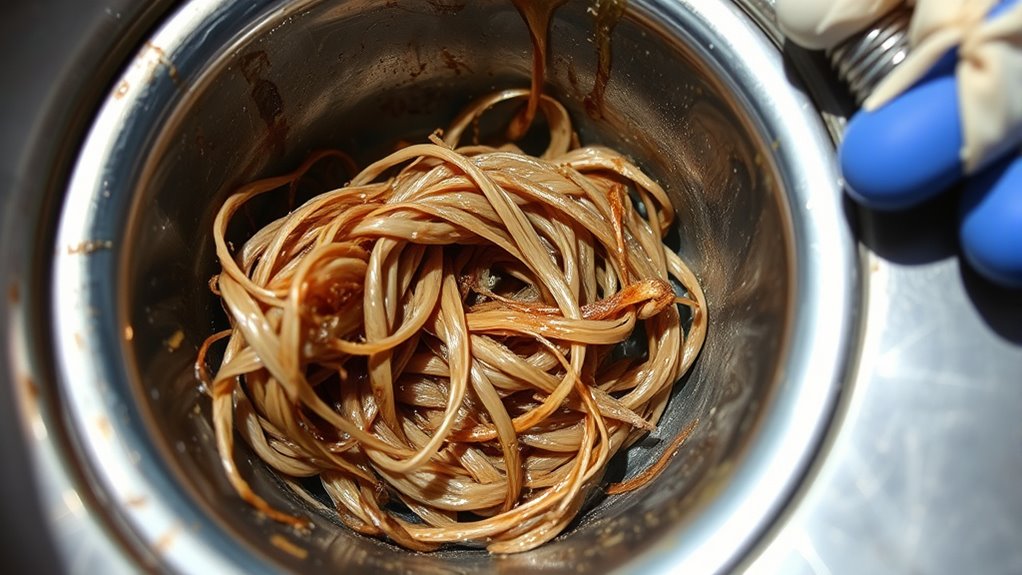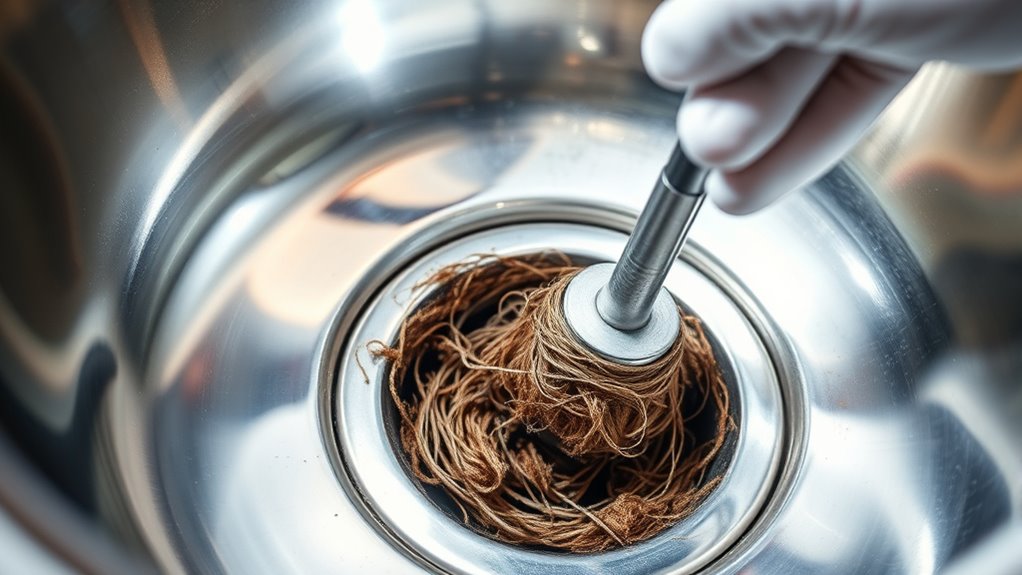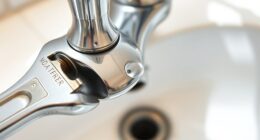To unclog a stubborn sink drain, start by pouring boiling water down the drain to loosen grease and organic buildup. Mix equal parts baking soda and vinegar, then pour it into the drain and cover to let it fizz for 15-30 minutes before rinsing with hot water. If that doesn’t work, use a drain snake to physically break up the clog. Keep in mind, applying proper maintenance techniques can prevent future issues—learn more to keep your drain clear longer.
Key Takeaways
- Start by pouring boiling water into the drain to loosen grease and organic buildup.
- Use a natural mixture of baking soda and vinegar, then flush with hot water after fizzing subsides.
- Insert a drain snake or auger and rotate to dislodge or hook onto stubborn debris.
- Apply a chemical drain cleaner carefully following manufacturer instructions for tough clogs.
- Regularly inspect and clean the drain using natural and mechanical methods to prevent future blockages.

A stubborn sink drain can be frustrating, especially when standard methods don’t do the trick. You might have tried plunging, using drain snakes, or pouring chemical cleaners, but nothing seems to clear the clog. That’s when understanding proper plumbing maintenance and effective drain cleaning techniques becomes essential. These strategies help you tackle tough blockages safely and efficiently, saving you money and hassle.
First, assess the situation. Before diving into more aggressive methods, make sure there’s no simple cause like a minor blockage or a trapped object. Remove the sink stopper or strainer to check for visible debris. Sometimes, hair, soap scum, or other buildup can cause slow drainage or complete clogging. Regular plumbing maintenance includes periodic cleaning to prevent these issues from escalating. If the drain remains stubborn, it’s time to escalate your approach.
Start with hot water. Pour boiling water directly into the drain to loosen greasy buildup. Follow this with a mixture of baking soda and vinegar—about half a cup of baking soda, then a half cup of vinegar. Cover the drain to contain the fizzing reaction, and let it sit for 15-30 minutes. This natural drain cleaning technique can dissolve organic matter and clear minor obstructions. Flush again with hot water afterward. If the clog persists, it’s a sign that more advanced drain cleaning techniques are needed.
A manual drain snake or auger can be very effective at breaking up stubborn blockages. Insert the snake into the drain, turning the handle clockwise as you push it through the pipe. When you feel resistance, it indicates you’ve reached the clog. Continue rotating to dislodge or hook onto the debris, then pull it out. Clean the snake thoroughly afterward. This method is a practical part of ongoing plumbing maintenance and helps avoid future clogs.
If you’re still facing trouble, consider using a chemical drain cleaner designed for tough clogs, but do so sparingly. Always follow the manufacturer’s instructions and wear protective gear, as these chemicals can be hazardous. Avoid overusing them, as they can damage pipes over time.
Additionally, using techniques aligned with home plumbing principles can ensure your drain remains clear and functional for longer periods.
Frequently Asked Questions
Can I Use Chemical Drain Cleaners Safely?
You might wonder if chemical drain cleaners are safe to use. While they can be effective for drain cleaning, you should prioritize chemical safety. Always follow the manufacturer’s instructions closely, wear gloves and eye protection, and avoid mixing chemicals. Be aware that harsh chemicals can damage pipes or pose health risks. Consider safer alternatives like enzymatic cleaners or mechanical methods, especially for stubborn clogs, to keep your plumbing and health protected.
How Often Should I Perform Drain Maintenance?
You should perform drain maintenance every few months to prevent clogs. Regular preventive maintenance with DIY solutions like pouring boiling water or baking soda and vinegar can keep your drains clear. Avoid overusing chemical cleaners, as they can damage pipes. By staying proactive and doing routine checks, you’ll reduce the likelihood of stubborn clogs and keep your sink functioning smoothly without costly repairs.
Is It Necessary to Wear Protective Gear?
When working on drain safety, wearing protective gear is highly recommended. Protective gear like gloves and goggles shields you from harmful chemicals and debris that may splash or come into contact with your skin and eyes. This safety measure helps prevent injuries and exposure to potentially dangerous substances. Always prioritize your safety by using proper protective gear, especially when dealing with stubborn clogs or harsh drain cleaners.
What Are Signs of a Serious Plumbing Issue?
You might think minor clogs are no big deal, but signs of a serious plumbing issue include persistent odors, slow drainage, water backups, and gurgling sounds. Don’t ignore these warning signs; they signal it’s time for a thorough plumbing inspection and drain troubleshooting. Addressing problems early prevents costly repairs, so stay vigilant and act quickly when you notice these symptoms. Early detection keeps your plumbing running smoothly.
When Should I Call a Professional Plumber?
When your sink remains clogged despite DIY tips, it’s time to call a professional plumber. If you notice persistent slow drainage, bad odors, or multiple fixtures affected, plumbing inspections are essential. Don’t risk worsening the problem; a plumber can quickly diagnose underlying issues and provide effective solutions. Trust their expertise to handle stubborn clogs safely, ensuring your plumbing system stays in top shape and prevents future problems.
Conclusion
Remember, your sink drain is like a clear stream—when free of blockages, it flows effortlessly. By tackling stubborn clogs, you’re removing the rocks and debris that hinder its flow. Think of each step as clearing the path for fresh water to run smoothly again. With patience and the right tools, you’ll restore your drain’s natural rhythm, turning a stubborn obstacle into a symbol of your problem-solving power and the renewed flow of your daily life.









